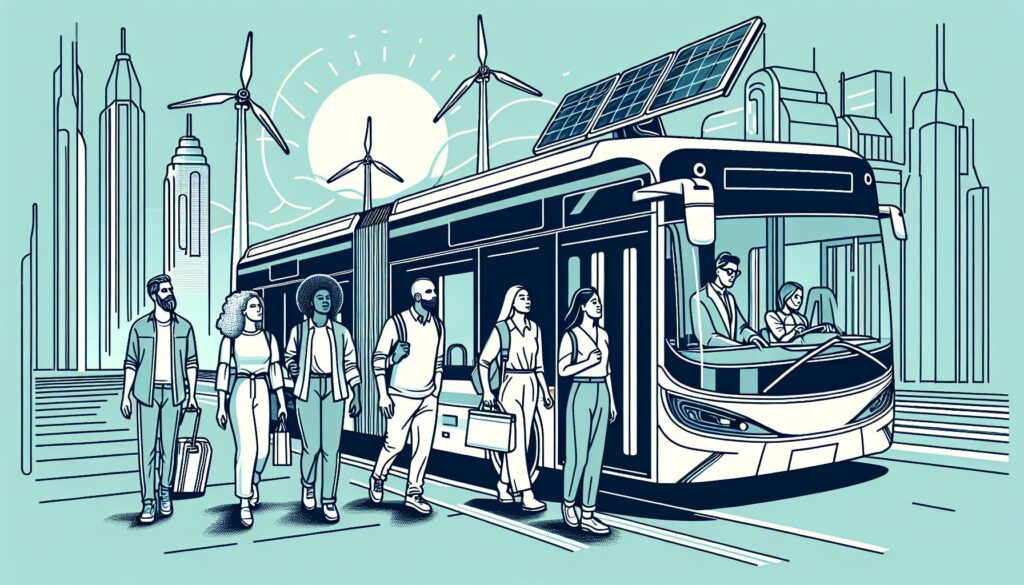As a seasoned traveler, I’ve always been on the lookout for ways to reduce my carbon footprint while exploring the world. In this article, I’ll be diving into the realm of eco-friendly transportation and sharing some top-notch options for the conscious traveler. From electric cars to bicycles, there are plenty of sustainable ways to get around that not only benefit the environment but also enhance your travel experience.
Join me on this eco-conscious journey as we explore the latest trends and innovations in sustainable transportation. Whether you’re planning a weekend getaway or a cross-country adventure, incorporating eco-friendly modes of travel into your itinerary can make a significant difference. Let’s empower ourselves to make greener choices and pave the way for a more sustainable future of travel.
Electric Cars: Driving Toward a Greener Future
When it comes to eco-friendly transportation, electric cars are increasingly becoming a popular choice for conscious travelers. With zero tailpipe emissions, electric vehicles significantly reduce air pollution and carbon emissions compared to traditional gasoline-powered cars.
Advancements in battery technology have extended the driving range of electric cars, making them a practical option for both short commutes and longer road trips. Additionally, many countries now offer incentives such as tax credits and reduced registration fees to encourage the adoption of electric vehicles.
Charging infrastructure is also rapidly expanding, making it easier for electric car owners to find charging stations along their routes. The convenience of home charging further enhances the appeal of electric cars, allowing owners to recharge their vehicles overnight.
From sleek sedans to spacious SUVs, the variety of electric car models available in the market continues to grow, catering to different preferences and lifestyles. By choosing to drive an electric car, travelers not only reduce their environmental impact but also experience the quiet and smooth performance characteristic of electric vehicles.
Public Transportation: Sustainable and Efficient
When considering eco-friendly transportation options, public transportation stands out as a sustainable and efficient choice. With buses, trains, trams, and subways, public transit systems offer a collective mode of transport that significantly reduces traffic congestion and greenhouse gas emissions.
Here are some key points highlighting the benefits of public transportation:
- Reduces Individual Carbon Footprint: Opting for public transportation instead of driving a car decreases each traveler’s carbon footprint.
- Cost-Effective: Public transport fares are often more affordable than the expenses associated with owning and maintaining a personal vehicle.
- Promotes Community Engagement: Public transportation connects individuals from diverse backgrounds and fosters community interaction during travel.
- Alleviates Traffic Congestion: By accommodating multiple passengers, public transit helps reduce the number of single-occupancy vehicles on the road.
Efforts to enhance public transportation infrastructures, such as the development of bus rapid transit (BRT) systems and the integration of clean energy sources into fleets, contribute to making public transport more eco-friendly and appealing to conscious travelers seeking sustainable mobility solutions.
Cycling: Pedaling Your Way to Eco-Friendly Travel
As an eco-conscious traveler, cycling is a fantastic option for reducing your carbon footprint and enjoying sustainable mobility. Riding a bike not only helps the environment but also promotes health and well-being. Here are some key points to consider:
- Zero Emissions: Cycling produces no harmful emissions, making it a truly eco-friendly mode of transportation.
- Promotes Physical Health: Regular cycling can improve cardiovascular fitness, muscle strength, and overall stamina.
- Cost-effective: Biking is a budget-friendly way to travel, saving money on fuel and maintenance costs.
- Reduces Traffic Congestion: By choosing to cycle, I can contribute to reducing traffic congestion and making roads less crowded for everyone.
Data and Statistics:
| Fact | Data |
|---|---|
| Average annual cost of cycling maintenance | $300 |
| Calories burned per hour of cycling at a moderate pace | 400-600 |
| Reduction in CO2 emissions per mile compared to driving a car | 1 pound |
Considering these benefits, cycling emerges as a sustainable and efficient transportation option for conscious travelers looking to make a positive impact on the environment.
Green Energy Vehicles: Harnessing Sustainable Power
Opting for electric vehicles (EVs) is a significant step towards reducing carbon emissions. With zero tailpipe emissions, EVs play a crucial role in combating air pollution and improving air quality in urban areas. Hybrid vehicles are another excellent choice, combining an internal combustion engine with an electric motor. These vehicles are highly efficient, using less fuel and emitting lower levels of greenhouse gases compared to traditional vehicles.
Public transportation systems powered by green energy sources are also gaining popularity. Buses, trains, and trams running on electricity generated from renewable sources like solar or wind power are becoming more common in cities worldwide. Embracing these sustainable modes of transport reduces the reliance on fossil fuels and mitigates the environmental impact of traditional public transportation.
In addition to electric and hybrid vehicles, biofuels are emerging as a viable alternative for powering cars and trucks. These fuels, derived from organic matter like crops and agricultural waste, offer a renewable and cleaner option compared to conventional gasoline and diesel. By utilizing biofuels, we can significantly reduce carbon emissions and lessen our dependence on non-renewable resources.
| Statistics | Data |
|---|---|
| Global electric car stock by the end of 2020 | 10.2 million vehicles |
| Increase in global electric car sales from 2019 to 2020 | 43% |
| Percentage of renewable energy in global public transport systems | 16% |
Key Takeaways
- Electric cars are a popular choice for conscious travelers due to zero emissions and expanding charging infrastructure.
- Public transportation reduces individual carbon footprints, promotes community engagement, and alleviates traffic congestion.
- Cycling is a sustainable mode of transportation that supports physical health, saves money, and reduces emissions.
- Green energy vehicles, including EVs, hybrid vehicles, and public transit systems powered by renewable sources, are effective in combating air pollution and reducing greenhouse gas emissions.
Conclusion
Exploring eco-friendly transportation options has shown me the vast potential for reducing carbon emissions and promoting sustainability in the travel industry. Electric vehicles and hybrid cars offer practical solutions for environmentally conscious travelers looking to make a positive impact. The integration of renewable energy sources in public transportation systems marks a significant step towards a greener future. Biofuels emerge as a promising alternative, paving the way for cleaner and more sustainable journeys. The statistics on global electric car adoption and the shift towards renewable energy in public transport underscore the growing momentum towards eco-friendly transportation solutions. Embracing these options not only benefits the environment but also contributes to a more sustainable and responsible approach to travel.



